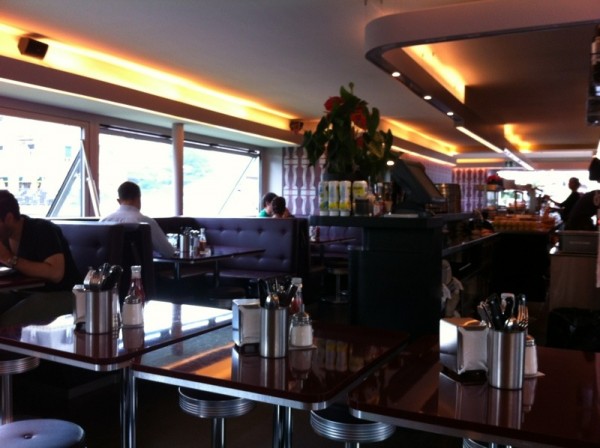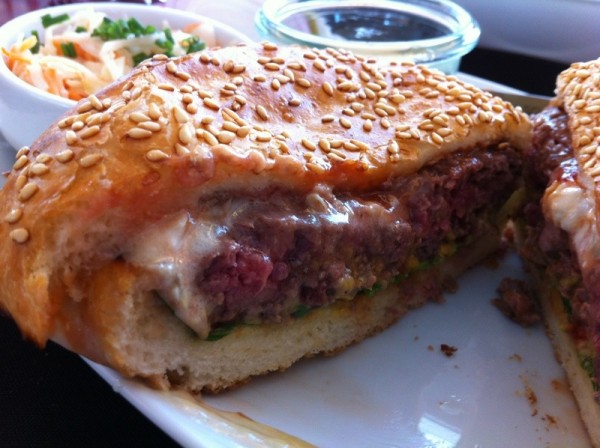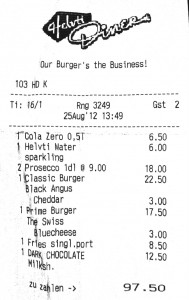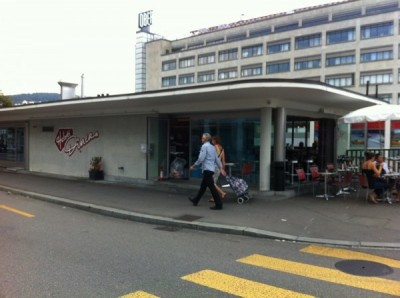Tchaikovsky’s «Swan Lake» meets street dance. High culture and entertainment merge together to create an audio-visual synthesis of the arts. «Swan Lake Reloaded» breaks away from traditional ballet and takes the much-loved masterpiece into a new dimension – for the most spectacular dance show of recent times. The production combines the highly demanding choreography of a street dance show with classical elements. «Swan Lake Reloaded» premiered in Stockholm in December 2011 to great acclaim from critics and audiences alike. The show sold out for its entire run in no time, with over 40,000 tickets being snapped up. Now the production’s Swiss premiere is to take place at Zurich’s MAAG Halle venue in April. We are pleased to offer zuirichexpats readers a 20% discount on selected tickets. For further details on the discount, please consult this document. For further information: www.swanlake-show.ch
All posts by Zurich Expats
Introducing Classified Ads
As we have had a lot of requests to post or broadcast small ads, we are today trialling a new classified ads service on zurichexpats.com. This is in beta at the moment so we are not charging a fee, but once fully live, ads can be added for just 5 CHF per month.\r\n Ads are now fully live and you can post your ad for just 5 CHF per month! Posting an ad requires registration but you can browse the ads without registering. So, if you have something you want to advertise or sell, please visit our Classified Ads Page. As we are testing this, we very warmly welcome any feedback either by email or in the comments.
Zurich Expats Newsletter December 2012
Welcome to the first newsletter from zurichexpats.com!
This month we have some tips on what to do with guests at this time of year as well as a tantalising offer of the Expat Card for FREE!
As Christmas is rapidly approaching and snow is fresh on the ground, it’s a typical time of year for family and friends to visit to experience something more akin to the Christmas card version of Christmas.
Luckily there are loads of things to do in Zurich and further afield to keep your guests busy whilst also making sure they will be gazing wistfully out of the window on their journey home planning their trip back next year – as long as that is what you want!
From six years of Christmas in Zurich, here are our favourites:
- Ice skating at the Dolder. A journey that takes you up the charming Dolderbahn to the woods above Zurich. Next to the luxurious Dolder Grand you will find the Eisbahn, which also has a snack bar from where you can watch the skaters once you have finished your own exertions.
- Zurich HB Christmas Market. Revel in the opportunity to pay eye-wateringly high prices for soap and bits of wood! Seriously, it is a nice way to spend half an hour or so and the food from kiosks is great. This year including strudel (although cold), great wursts and crepes. Crowned as ever by the glory of the Swarovski tree which is truly spectacular.
- Train travel to the mountains. Take a morning train to Luzern and spend an hour walking through its lovely streets. Grab a coffee and then head back to the station for a train to Engelberg where you can catch the cable car up Mount Titlis. Stunning, breathtaking and essentially Swiss.
Got some tips of your own? Share them with us on Twitter! Currently on the site we have two timely articles on the site that we would like to point out. The first, from Cecily Weeks will be of great interest given the time of year . Read Cecily’s guide to the main players in a Swiss Christmas. Also worth a read is Christian Langenegger’s analysis of the recent vote regarding the disclosure of previous rental costs. Finally we are extremely excited to be able to offer the excellent Expat Card for Free to Zurich Expats. Whether your a new arrival, or an Expat who has lived in Zurich for a while, we have all admired the glitz and glamour lining Bahnhofstrasse. But living in a city consistently named one of the “most expensive in the world” certainly can have its drawbacks at times. Prices might seem a bit steep to newcomers and confusion on where to turn for friendly businesses might be overwhelming. That’s where The Expat Card comes in. It’s a card designed to offer discounts at over 70 Expat-friendly businesses and solve your franc savvy worries. Definitely your introduction to the best (and often only) bargains in town! The great news is that The Expat Card is now FREE for all members of Zurich Expats! All you need to do is fill out the form below, and they will send you your card within 20 days – Get The Expat Card For FREE. More info available from their website – www.theexpatcard.ch.
That’s all from us for this month. As always we are looking for good articles that are relevant to people living and working in Zurich so if you would like to contribute, please contact us. We would also like to feature your story in the monthly newsletter. It involves answering just a handful of questions about what took you to Zurich and your life here. if you would like to be featured, please contact us via the site. Finally, please let us know what you would like to read about on zurichexpats.com. if there is a particular aspect of life as a Zurich Expat you would like us to cover, we will be more than happy to do it. Thanks again for reading, enjoy a wonderful Zurich Christmas! Andrew Buonocore zurichexpats.com
Newsletter Test
here is my newsletter What do you think?
Culture Stress: Long-Term Impact On The Health Of Expats
What is culture-stress and how does it impact on people’s health?
John Bowlby (1907-1990) was an internationally renowned psychiatrist and the father of ‘attachment theory’. In one of his famous lectures, he stated:
A particular clinical and research problem is that disturbed individuals seem often to maintain more than one working model both of the world and of the self in it. Such multiple models, moreover, are frequently incompatible with each other and can be more or less conspicuous.
Although John Bowlby was not referring specifically to culture-stress in this lecture, his statement accurately captures what can happen to people who integrate more than one culture into their minds and their lives. Under the surface, they become confused about their values, their identity and how they should think and behave. This can create deeply-seated stress, as we will see below.Over the past twenty-five years, two different Swiss organisations have been observing the effects of stress and culture-stress on people and families, including ex-pats living in Switzerland.
- At the Praevmedic medical clinic in Zürich, people have their health checked, either as a routine preventive measure, or because they have some serious concerns about their health. The people who go to the clinic are of different age-groups and different cultural backgrounds. Sometimes, they are sent by their employers; others go there voluntarily. The task of the Praevmedic staff is to identify any symptoms which need particular attention and to treat the underlying causes of such symptoms.
- At the 5C Centre in Zug, which lies a few kilometres south of Zürich, people get help with resolving cultural conflicts and personal crises. The majority of these situations arise because of frictions between competing value-systems or ‘cultures’. The latter are related to people’s social and ethnic backgrounds, their family life and the environments in which they currently live and work. The task of the 5C staff is to identify the true sources of the problems and to help people resolve them.
Below is a list of the insights which these two organisations have gathered in helping and treating ex-pats who live in the German-speaking part of Switzerland:
Culture stress
- The impact of culture-stress on people’s physical and mental health is widely under-estimated.Many people find it difficult to pinpoint or explain the reasons for their lack of well-being.The reason for this is that culture-stress involves deeply-seated emotions and often quite complex dynamics of values. Neither of these phenomena lends itself easily to simple analysis or explanation.As a consequence, culture-stress often goes either misdiagnosed or completely undiagnosed for many years. This can lead to severe or even chronic health problems. In some cases, it also leads to irreversible problems in families and at work. Many of the causes of the more severe forms of culture-stress are laid out below.
- The ability to handle culture-stress varies strongly from one individual to another, even within the same family or working group.Consequently, those suffering from deep culture-stress can sometimes get overlooked and ignored by others. Many sufferers are classed as ‘over-reacting to their new environment’. In such cases, the sufferers then tend to regard themselves as being ‘abnormal’ and try to suppress their problems. This, of course, then intensifies the impact of the culture-stress on their behaviour and health.
- Proneness to culture-stress varies not only from individual to individual, but also from culture to culture. Different cultures also have different ways of handling cultural dissonance.For those people who are culturally conditioned to see the world as a ‘global village’, cultural differences tend to have a much lower significance than for those who see the world getting ‘larger’, i.e. as getting increasingly diverse. Some cultures engage with others with greater initial caution than others. Interactions between cultures which differ in such ways can lead to quite considerable tensions. Issues like ‘inadequate respect’ and ‘mistrust’ can sometimes arise quite quickly; sometimes they only arise only after a period of months or even years. Regardless of the time period, issues like these can, of course, damage relationships very seriously.
- Culture-stress can arise not only because of differences of national or religious values, but also because of differences of corporate, social, family and personal values. In fact – depending on the definitions one is using – ‘culture-stress’ can be classed either as a synonym for, or as a subcategory of, ‘value-system stress’.
- For those who suffer under the most intensive forms of value-system stress, the roots often lie in multiple sources of value-system dissonance (see below). This makes it all the more difficult for them to realise what the true cause of their symptoms is.Those who suffer under value-system stress from multiple sources such as their workplace, their families and their acquaintances can become extremely isolated and depressed.
- Value-system stress at work can also lead to the accentuation of other underlying conflicts, e.g. between husband and wife, or between children and parents. Problems which had been lying dormant for several years can suddenly come to the surface and create quite stressful dynamics.
- In other cases, people have value-system conflicts inside themselves, again very often without realising it. These can arise when a person internalises more than one value-system, e.g. during childhood or in later life. Such ‘intra-psychic conflicts’ are quite common and vary in intensity from one person to another. They are often the root of symptoms like low self-esteem, depression, burnout and isolation. If a person already possesses inner value-system stress, this can also make it difficult for him/her to come to terms with a move to another cultural environment. In fact, a move to a different country, a change of employer or a new private relationship can trigger the outbreak of issues which have been lying suppressed or misdiagnosed for many years.Cultural assimilation – sometimes the cure, sometimes the problem
- Many people are able to assimilate into a new culture without too many problems. Such people are said to possess a high level of ‘intercultural competence’, at least in relation to the specific new cultural environment.
- However, although ‘cultural assimilation’ can indeed significantly reduce culture-stress in the individual, it can also create new conflicts and stress within families and groups.This occurs quite frequently and it arises when one or more members of a family or a group assimilate more than the others.Even international joint-ventures and strategic alliances can break down not only as a result of cultural dissonance between the parties, but also because of differing levels of cultural assimilation among the members of each party.
- In the case of individuals who are able to adapt very quickly, cultural assimilation can have the effect that they inadvertently internalise a new value-system which eventually turns out to be strongly incompatible with a previously existing value-system. This in turn creates inner stress, i.e. an intra-psychic conflict (see above). Almost paradoxically, culture-stress arises as a result of their ability to adapt. In some cases, intra-psychic conflict of this nature can require very intensive treatment to resolve it.
- Culture-stress is not always noticeable immediately. Some people give the impression that they are assimilating into the local culture, often even believing themselves that they have truly assimilated. However, it can turn out later that that person’s assimilation has only been partial and that, at a more fundamental level, a deep form of cultural dissonance remains.
- In the so-called ‘second generations’ of families who have moved to another country, it can happen that young people resist the ‘new’ cultural environments, even though they have grown up there. Instead of assimilating, they prefer to identify themselves with the cultural origins of their parents. The culture-stress which then arises inside themselves is very often suppressed which this can have surprising and uncontrollable effects on their emotions and behaviour.
- In other cases, the assimilation process can be so strong and ‘dominant’ that people experience acute forms of culture-stress when they are faced with returning to live in their original cultural environments.Cultural bereavement
- In some cases, people come to the subconscious realisation that circumstances are such – and their assimilation is and must be so strong – that they must depart from their original cultural identity. The process of ‘cultural bereavement’ can be just as painful and stressful as bereavement over the loss of a person whom one has dearly loved. In fact, ‘cultural bereavement’ can be even more painful and stressful, because it is to a great extent a purely internal process involving ‘departure from attachment to oneself’.
In conclusion, culture-stress, cultural assimilation and cultural bereavement can impact quite seriously on the physical and psychological health of individuals and their families. A great part of the problem lies in the fact that the true source of their problems is often not adequately understood. Once properly understood, many people can often resolve their problems quite quickly and do not need further external help. Others need more extensive treatment involving a combination of appropriately specialised psychological and physical treatment.
What can be done to recognize and overcome the effects of ‘culture-stress’ and ‘value-system stress’?
Drawing on the insights above, the following tips may be useful for ex-pats living in German-speaking Switzerland:
- Be attentive to the fact that, even within the same family, different people deal with new cultural environments and new value-systems in strongly differing ways. If you are a parent, for example, and you seem to be able to handle such changes quite easily, do not overlook
- what may be going on inside your partner or your children and
- what may be going on at a deeper level inside yourself.
- Be particularly sensitive to those around you who shows signs of
- reduced energy and motivation
- poor performance
- sleeping problems
- questions about their identity and purpose
- increased feelings of anxiety, isolation or depression
- increased reactiveness or aggressiveness
- reduced immunity to infections
- increasing outbreaks of allergies
- increased suffering from pains in the back, chest, head or stomach,
- increasing relationship difficulties and conflicts with others.
- Be attentive to the fact that fundamental changes which take place at an early age (up to around 14 years old) can have a particularly deep and lasting impact on a person’s health and social behaviour. This applies especially to fundamental changes concerning a person’s affectional bonds, whether these be bonds with their parents, their family or their cultural environments.
- Be aware of the fact that human nature tends to take matters most seriously when problems are at their most acute. Prevention, so we are told, is better than cure. However, whether a problem has already become acute or not, the most crucial aspect of any remedy is to get the problem accurately diagnosed. If addressed early enough, the solution often lies in merely pinpointing and understanding the true cause of the problem. Given the complexity of the phenomena and the effects of culture-stress, cultural assimilation and cultural bereavement, ensure that you get adequately qualified help. Be particularly wary of getting help and advice from people who are not experienced in intercultural matters. However well-meant that advice might be, it could make the problem worse rather than alleviating it.
Stuart Robinson 15th September 2012If you are interested in a talk being given by Stuart on this topic, please make contact via zurichexpats.com
Worth Checking Out – NewInZurich.com
NewInZurich is website dedicated to the same audience as ours – people living in or moving to Zurich. We asked them for some info on the site, here is what they have in store for you. We certainly recommend paying them a visit:
You’ve just arrived in Zurich and using your best German you ask for directions from the train station. The person you’re addressing seems to understand you – yippee! – but the reply you get is full on “Züridütsch” and you don’t understand a word! You put your rubbish out just like everyone else on ‘bin day’ and as you have some spare black bin liners left over from the move you use those up – but in the evening when you return from work everyone else’s rubbish has been collected – but yours is still there! You’ve only been driving a couple of weeks and you’ve already amassed a number of speeding tickets – where ARE they coming from and how can you avoid any more! You’ve been invited to your neighbour’s Apero and as you’re thirsty you start drinking the proffered wine glass straight away – but when you look round everyone is staring at you and nobody else has had a drop! If any other these issues are similar to encounters that you may already have experienced then NewInZurich is here to help! NewInZurich is familiar with all the situations you might experience when arriving in Zurich for the first time and we provide Welcome Talks and Workshops to help you deal with the practical side of life. We explain some of the unwritten ‘rules’ so that you can find your way round this beautiful city and feel at home in the shortest time possible. Our talks and Workshops are for individuals, couples, families, as well as school and companies, and they can be held in the comfort of your own home or in your office, or at one of at our locations. We know great places to eat, where to buy the things you crave and can recommend brilliant days out for all the family. We can even take you on historic tours of Zurich. What’s more, we have a website NewInZurich.com filled with practical information as well as ideas on new places to go and things to do. Trust us – you will never have a dull moment in Zurich! NewInZurich – we’re here to make you feel at home and enjoy Zurich to the full!
We are always interested in sources of information for our audience so if you have a site of interest, please get in touch.
Burgers At The Helvti Diner, Zurich
I do love a good burger. I even remember the best one I ever had, at the Sheraton Hotel at Malpensa airport, Milan of all places. When I was contacted by the Helvti Diner I immediately arranged a visit to sample the burgers there, as well as being excited by the range of side dishes, drinks and other Americana. We went to the Helvti Diner in Zurich on a Saturday afternoon. It was well patronised but thankfully not full although it did fill up more while we were there. The interior is a pretty faithful representation of an American diner with some Swiss touches like low backs on the booth furniture.
The waitress who took our order was very nice and also asked if we wanted her to speak German or English. We ordered a Swiss Prime burger and a Classic burger which is made from Angus beef. Also available is a wagyu beef patty. I am glad that the words “Kobe beef” we’re not mentioned anywhere because as I recently discovered, real Kobe beef cannot be exported out of Japan. I was pleased that the burger choice was not huge. They have taken the view of offering their burgers in three types of beef and given the customer the choice of size, sauces, accompaniments and how they wish it to be cooked. Some places take a burger, add some cheese and a fried egg and give it a separate place on the menu under a name like the Farm burger or something. I prefer the approach of the Helvti. Take your burger, add what you want and tell us how you want it cooked. We went for BBQ sauce with one and garlic mayo with the other as well as a portion of fries to share. Soft drinks come in a 500ml glass if you so choose. When the food came, I cut mine in half to inspect the cooking. I asked for mine to be medium rare and I would say it was spot on.
My wife went for well done and again it was good. Well cooked but not dry. We had no complaints at all about the burgers in terms of flavour or quality. Mine left a lot of liquid behind on the plate, I might go for Medium next time but I like a burger to be juicy. The fries were really good, as were the sauces. The BBQ sauce was a different colour to what you would expect (it is in the small glass dish in the photo above this paragraph) and had a nice little spice kick.
We had no complaints at all about the burgers in terms of flavour or quality. Mine left a lot of liquid behind on the plate, I might go for Medium next time but I like a burger to be juicy. The fries were really good, as were the sauces. The BBQ sauce was a different colour to what you would expect (it is in the small glass dish in the photo above this paragraph) and had a nice little spice kick. The garlic mayo was delicious. Both buns were nicely toasted, but I wouldn’t say they added much to the burger. A touch I liked was that the burger is served straight up. In the bun, you get your beef patty atop a slice of lettuce with any cheese you have requested and any extra like the egg. The usual garnish like tomato, gherkin and more lettuce is served nicely presented, on the side, for you to add as you wish. We rounded things off with an excellent dark chocolate milk shake. So, lots to like. The service was very good, the burgers certainly were excellent as were the fries. As I said, I like the way the menu is presented as well as letting you choose how to add the garnishes. In terms of presentation and taste, absolutely no complaints. One negative I have to stress is the price. A bill of 100 CHF for two people is hefty for a burger meal. Here’s our receipt so you can see exactly what we had (click for a larger image):
12.50 CHF for a 355ml milk shake is extremely expensive, no matter how good, and is something I could not justify choosing again. A prosecco at 9 CHF, however, is decent value for Zurich. There is a reason for the prices. In true Swiss fashion, the prices are justified by the quality of the ingredients. For example, the shake contains three scoops of premium ice cream, no milk powder or artificial flavourings. When it comes to the meat, the burgers contain no filler so no cheaper pork or bread to bulk it up. Their belief is that the Helvti Diner is the only place in Switzerland to feature only 100% beef in its burgers. As we were there on a Saturday afternoon, we did not sample the bar but the selection of drinks and cocktails is impressive. Any bar that offers Hendricks gin knows what they are doing! Worth noting that from October 2012, they are starting a Happy Hour on Fridays from 22:00 to midnight. We will definitely go back to the Helvti Diner, we enjoyed our meal there very much. If prices were more reasonable, I would probably try to get there at least every two weeks. As it stands we will go there perhaps a couple of times a year. I do recommend you try it and decide for yourself.
Helvti Diner Kasernenstrasse 2 8004 Zürich Tel: +41-43-322-04-24 Opening Hours:
| Monday – Thursday | 11.30-14.30 18.00-23.00 |
| Friday | 11.30-14.30 18.00-01.00 |
| Saturday, brunch | 10.00-16.00 18.00-01.00 |
| Sunday | closed |





